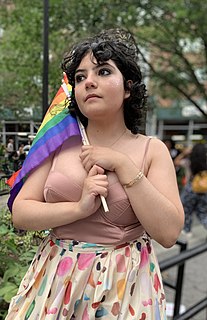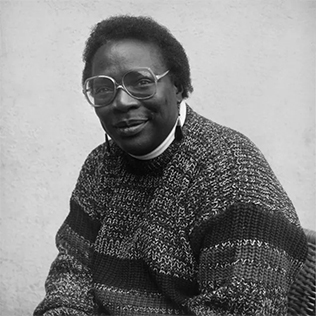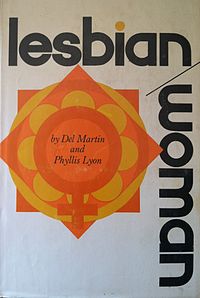
A lesbian is a homosexual woman. The word is also used for women in relation to their sexual identity or sexual behavior, regardless of sexual orientation, or as an adjective to characterize or associate nouns with female homosexuality or same-sex attraction.
Radical feminism is a perspective within feminism that calls for a radical re-ordering of society in which male supremacy is eliminated in all social and economic contexts, while recognizing that women's experiences are also affected by other social divisions such as in race, class, and sexual orientation. The ideology and movement emerged in the 1960s.

Femme is a term traditionally used to describe a lesbian who exhibits a feminine identity.

Gayle S. Rubin is an American cultural anthropologist best known as an activist and theorist of sex and gender politics. She has written on a range of subjects including feminism, sadomasochism, prostitution, pedophilia, pornography and lesbian literature, as well as anthropological studies and histories of sexual subcultures, especially focused in urban contexts. Her 1984 essay "Thinking Sex" is widely regarded as a founding text of gay and lesbian studies, sexuality studies, and queer theory. She is an associate professor of anthropology and women's studies at the University of Michigan.
Black feminism is a philosophy that centers on the idea that "Black women are inherently valuable, that [Black women's] liberation is a necessity not as an adjunct to somebody else's but because our need as human persons for autonomy."
Gary William Kinsman is a Canadian sociologist. Born in Toronto, he is one of Canada's leading academics on lesbian, gay, bisexual and transgender issues. In 1987, he wrote one of the key Canadian texts on LGBT social history, Regulation of Desire, reprinted in 1995. In 2000, he edited and co-authored a second work, on Canadian federal government surveillance of marginal and dissident political and social groups, Whose National Security? In 2010, Kinsman's newest book, The Canadian War on Queers: National Security as Sexual Regulation, co-written with Patrizia Gentile, was published by University of British Columbia Press and released on 1 March.
Sheila Jeffreys is a former professor of political science at the University of Melbourne, born in England. A lesbian feminist scholar, she analyses the history and politics of human sexuality.

LGBT parenting refers to lesbian, gay, bisexual, and transgender (LGBT) people raising one or more children as parents or foster care parents. This includes: children raised by same-sex couples, children raised by single LGBT parents, and children raised by an opposite-sex couple where at least one partner is LGBT.
Feminist sexology is an offshoot of traditional studies of sexology that focuses on the intersectionality of sex and gender in relation to the sexual lives of women. Sexology has a basis in psychoanalysis, specifically Freudian theory, which played a big role in early sexology. This reactionary field of feminist sexology seeks to be inclusive of experiences of sexuality and break down the problematic ideas that have been expressed by sexology in the past. Feminist sexology shares many principles with the overarching field of sexology; in particular, it does not try to prescribe a certain path or "normality" for women's sexuality, but only observe and note the different and varied ways in which women express their sexuality. It is a young field, but one that is growing rapidly.
Cheryl L. Clarke is an American lesbian poet, essayist, educator and a Black feminist community activist who continues to dedicate her life to the recognition and advancement of Black and Queer people. Her scholarship focuses on African-American women's literature, black lesbian feminism, and the Black Arts Movement in the United States. For over 40 years, Cheryl Clarke worked at Rutgers, the State University of New Jersey, and maintains a teaching affiliation with the Graduate Faculty of the Department of Women and Gender Studies, though retired. In addition, Clarke serves on the board of the Newark Pride Alliance. She currently lives in Hobart, N.Y., the Book Village of the Catskills, after having spent much of her life in New Jersey. With her life partner, Barbara Balliet, she is co-owner of Bleinheim Hill Books, a new, used, and rare bookstore in Hobart. Actively involved in her community, Clarke along with her sister Breena Clarke, a novelist, organize the Hobart Festival of Women Writers each September

Pat Parker was an American poet and activist. Both her poetry and her activism drew from her experiences as an African-American lesbian feminist. Her poetry spoke about her tough childhood growing up in poverty, dealing with sexual assault, and the murder of a sister. At eighteen, Parker was in an abusive relationship and had a miscarriage after being pushed down a flight of stairs. After two divorces she came out as lesbian "embracing her sexuality" and said she was liberated and "knew no limits when it came to expressing the innermost parts of herself".

Julie Bindel is an English radical feminist writer. She is also co-founder of the law reform group Justice for Women, which has aimed to help women who have been prosecuted for assaulting or killing violent male partners.

Elizabeth Lapovsky Kennedy was one of the founding feminists of the field of women's studies and is a lesbian historian whose book Boots of Leather, Slippers of Gold: A History of the Lesbian Community documents the lesbian community of Buffalo, New York, in the decades before Stonewall.
Amber L. Hollibaugh is an American writer, filmmaker and political activist, largely concerned with feminist and sexual politics.

Lesbian/Woman is a work by the feminist and gay rights activists Del Martin and Phyllis Lyon, in which the authors discuss what it means to be a lesbian. The book was influential and is considered a foundational text of lesbian feminism. Reviewers believed that it benefited from its authors' personal experience as lesbians, and endorsed its criticisms of the treatment of lesbians by religious and professional organizations.
Feminist views on sexuality widely vary. Many feminists, particularly radical feminists, are highly critical of what they see as sexual objectification and sexual exploitation in the media and society. Radical feminists are often opposed to the sex industry, including opposition to prostitution and pornography. Other feminists define themselves as sex-positive feminists and believe that a wide variety of expressions of female sexuality can be empowering to women when they are freely chosen. Some feminists support efforts to reform the sex industry to become less sexist, such as the feminist pornography movement.

Feminism in Latin America is a collection of movements aimed at defining, establishing, and achieving equal political, economic, cultural, personal, and social rights for Latin American women. This includes seeking to establish equal opportunities for women in education and employment. Those who practice feminism by advocating or supporting the rights and equality of women are called feminists.
Beverly Greene is a professor in the Department of Psychology at St. John's University. She is a clinical psychologist known for her work on sexism, racism, and analyzing the intersectionality of social identities. As a specialist in the psychology of women and of gender and racial issues in the practice of psychotherapy, Greene has also created many public health frameworks for understanding mental health in marginalized communities. She is the author of close to 100 psychological literature publications. Greene is involved with the Association for Women in Psychology and the Society for the Psychology of Women. She is one of sixteen women to have received the Distinguished Publication Award (DPA) from the Association for Women in Psychology in 2008.
For the Hong Kong actress and singer, see Miriam Yeung.
Anne Bishop is a Canadian lesbian activist, educator, grassroots organizer and LGBT rights advocate.









